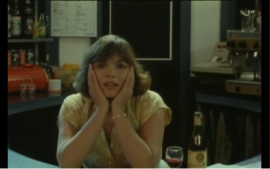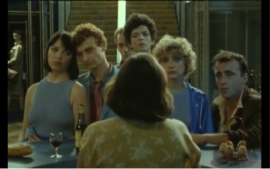It occurred to me that the motif of the shop window appeared in several films of the ‘Staging the Song’ program at this year’s Zomerfilmcollege, notably in One from the Heart, You and Me, Golden Eighties and Les Parapluies de Cherbourg. Very different films, yet all of them (with the exception of the Fritz Lang film) are musicals. Coincidence or deliberate program choices? But again, isn’t the cinema screen like a shop window trying to seduce us? And isn’t the film image in the musical, the most exuberant and utopian film form, always dressed like a shop window in a swank department store, full of spectacle and filled with the objects of our desires?
Chantal Akerman’s Golden Eighties (aka Window Shopping) is set entirely in a shopping mall (with the exception of the last few minutes). While Coppola’s One from the Heart (also a musical that plays with the formal conventions of the genre, read more about that here) opens with a sweeping camera movement from high up, Akerman’s camera is pointed at the marble floor of the gallery, showing us a parade of legs belonging to the women walking by donning colorful dresses and shoes. Mostly we see the women one at a time enter and exit the frame. Sometimes we see two or three of them. They are always walking in straight vertical/horizontal/diagonal lines, parallel to each other or in opposite directions; this is very precisely choreographed movement. In the next shot we see a woman kissing a man while exclaiming “que je t’aime, que je t’aime.” She turns her head (the camera turns with her) and kisses another man while exclaiming the same words. Love is a game in Golden Eighties.
Introducing the players: innocent, sweet Mado and introverted, intelligent Pascale who both work for the vampish Lili, manageress of a hair salon owned by Monsieur Jean, a gangster lacking in masculinity, a family man entangled in an affair with Lili. All three women are in love with Robert, a rather superficial character who works across from the salon in the bourgeois clothing store owned by his father, monsieur Schwarz. Robert fancies Lili but ends up proposing marriage to Mado only to return to Lili in the end, standing up Mado at the altar. Meanwhile, his mother Jeanne, a Polish camp survivor, has her own affair to attend to. A former lover, Eli, who had been an American GI during WWII, has come back to offer her a chance to escape her entrapped life. But she refuses and thereby reaffirms the status quo of her life. Then there is Sylvie who runs the coffee shop at the center of the mall. Her lover immigrated to Canada, looking for fortune, and sends her beautiful letters filled with longing. She sings about being together with him, but she’s less than pleased when she gets word he really is coming back. Reality can become frightening when you have been living in your dreams too long.
Akerman presents us a network narrative without a clear point of view belonging to any one particular character, following the developments in the ever-changing relationships between her ensemble cast. Akerman wouldn’t be Akerman if she hadn’t staged this very precisely. These bodies navigate the space they dwell in with a remarkable fluidity of movement. With the exception of Eli and Monsieur Jean, the shopping mall is their whole world and therefore they know it intimately. When they burst into song they not only sing for us, but also for the people around them. What is really put on display here are the characters themselves. But the act of window-shopping (like the act of looking at the cinema screen for that matter) doesn’t give you what you desire. It can only show you how to desire. Everyone in the film moves around each other but, like in the opening shot, nobody connects. There is no real exchange. There’s no forming of the couple like in The Band Wagon, where Fred Astaire and Cyd Charisse’s characters can’t stand each other at first (because they dance different styles) but still seek to understand one another and finally, while walking in Central Park, learn how to move their bodies in harmony, dance step by dance step.
Akerman doesn’t shy away from working within the classical narrative system. She gives us her own take on the cinema of spectacle and seduction. Many find her previous films or even the study she made for this film, Les années 80 (1983), more interesting and resonant. But if you look closely at Golden Eighties, you quickly see that Akerman is still dealing with the same preoccupations. In the end, the film is about movement, be it fast movement. Unlike some of her previous films where worlds are created in the duration of one shot, here everything seems to happen in the blink of an eye. But just like in her more celebrated earlier work, bodies still move through space and around each other in a ritualized choreographed movement, not slowly but with a desperate speed. Slow or fast, they remain unable to connect.
Sure, the characters in Golden Eighties cross paths, but no new situation arises. Nothing really changes in their relationships. There is no before and after like in the Minnelli musical. While Robert is engaged to Mado he still can’t resist the temptation to make love to Lili when she returns to the shopping mall after a spell of absence. Even if one were to think by reading a plot summary that Robert and Lili are some kind of star-crossed lovers (Robert is mocked by his friends as ‘Romeo of the trousers’), then one glimpse of Akerman’s mise-en-scène would suffice to discredit that notion. They make love in a dressing room cubicle, but Akerman’s camera again is pointed at the floor, showing only two pairs of shoes moving around and touching each other. No passionate lovemaking here, just a ‘changing of clothes’: Mado for Lili. Sure, nobody gets what they want, not even Monsieur Schwartz who uses the entanglements of love and betrayal surrounding Lili for his own profit by taking over the hair salon and turning it into a sportswear store. Unfortunately it doesn’t attract more customers. (The economic recession of the 1980s acts as a background to the film.)


Parallels can be drawn with Jacques Demy’s musicals, especially Les demoiselles the Rochefort (1967), a film that also carries a pervading sadness, in which the couples that seem meant to be aren’t given the opportunity to meet one another, an opportunity that is always there in the classical Hollywood musical. Remember Gene Kelly singing to Debby Reynolds ‘You were meant for me’ in Singin’ in the Rain. In Golden Eighties there is no such thing as ‘You were meant for me’. Characters cannot bear to not be in love. The desire for love seems more important than love itself. The young characters are trapped in this enclosed world of the shopping mall, destined to put themselves on display and perform the spectacle of love again and again.
Even Jeanne, finally given the opportunity to run away with her former lover Eli, cannot leave the safe daily routine of her work. They meet in secret during the screening of an adventurous science fiction film that is playing at the mall’s cinema (the 1980s is not only the age of the teenagers of John Hughes and Amy Heckerling but of course also of the dawn of the blockbuster). But even in the safe darkness of the cinema they are unable to reconnect. Jeanne is too worried about whether or not she left the key on the door of the store. Besides, the sound of the science fiction film is too loud, too intrusive and disrupts the intimacy of the reunion.
If you would get the impression from the description above that this is a very dark and cynical film, you would be mistaken. In fact, the film has a wonderfully playful ironic tone. Unlike One from the Heart where the songs are low-pitched, melancholic and slow, here they are catchy childlike rhymes sung in energetic high voices (‘Oh Lili Lili’, ‘Meli Melo’).
This contrast between the colorful innocent surface and the disruptive sadness just lurking behind it, gives this musical its power. Yet, even though the characters’ dreams turn out to be unreachable utopias, there is still genuine warmth in the way especially the women function as a small contained community. Take for example the song ‘Il pleut’, sung by the girls from the hair salon when it is raining outside and we realize for the first time how trapped they really are in the artificially lit, air-conditioned mall. While men in raincoats come into the mall to hide from the rain, the women sing of their desire to feel the refreshing drops of rain on their faces. The outside world is only shown in the very end when Mado, stood up at the altar by their son, lets Monsieur and Madame Schwartz guide her out of the shopping mall into the open air of the streets of Brussels, still wearing her wedding dress. Robert’s father delivers the closing statement of the film, comparing the game of love with changing clothes: ‘After all, one can’t walk around naked. If people did that we would be out of business.’ And while monsieur Schwartz’ sentiment may be a cynical one (love is bought and sold like clothes), finally catching a ray of sunshine and drawing a breath of the open air might offer some hope after all.